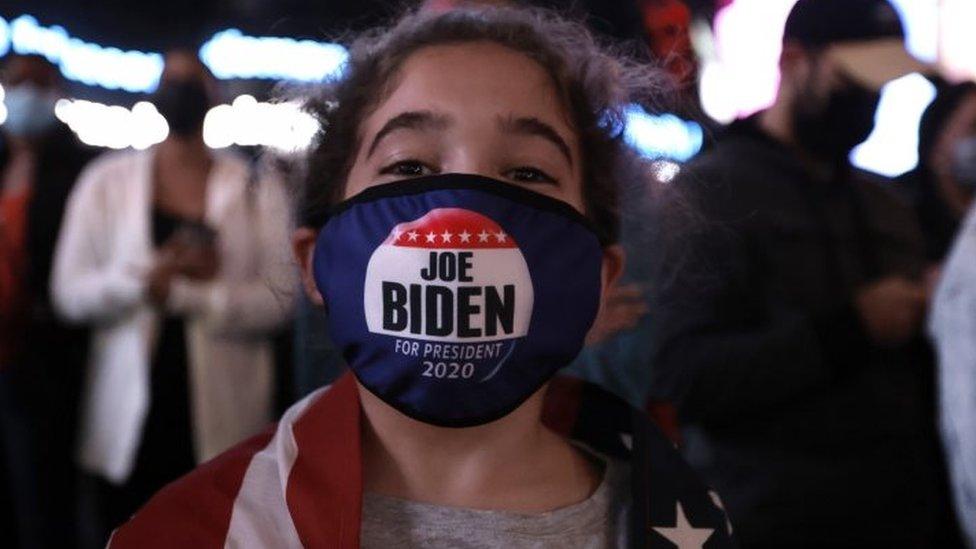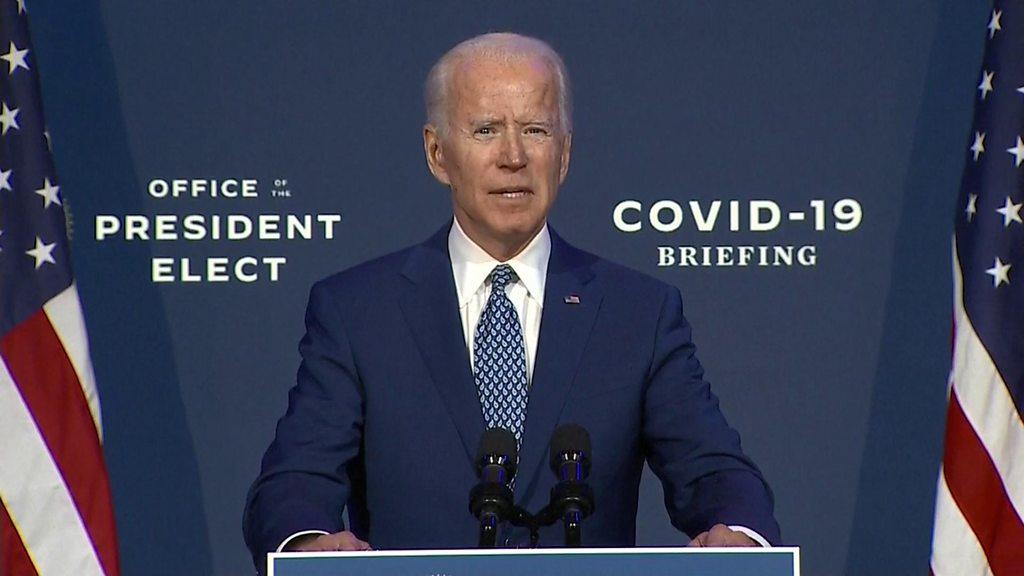US election: Biden urges mask-wearing to save 'thousands of lives'
- Published
Joe Biden: 'I implore you, wear a mask'
US President-elect Joe Biden has appealed to Americans to wear a mask as the best way to "turn this pandemic around".
Mr Biden said the US faced a "very dark winter" and the "worst wave yet", and Americans had to put aside political differences to tackle Covid-19.
He has named a new task force and vowed to "follow the science" as he puts together his transition team.
Donald Trump still refuses to concede defeat and is challenging key results.
He is taking legal action in several states.
Mr Biden's victory was declared on Saturday but it remains a projection, with a number of states still counting ballot papers. He leads Mr Trump in the nationwide vote by about 4.5 million.
Mr Biden and Vice-President-elect Kamala Harris have launched a website for the transition, external, saying the team will also focus on climate change, the economy and tackling racism.
But the president-elect will need the help of an agency called the General Services Administration to begin the transition process and its Trump-appointed head has given no indication when that will happen.
What are the Covid plans?
On Monday, Mr Biden set out the blueprints for his Transition Covid-19 Advisory Board, external.
In a TV address, he said "I implore you, wear a mask", calling it the "single most effective thing we can do to stop the spread of Covid".
He added: "A mask is not a political statement but it is a good way to start pulling the country together."
During the election campaign, his mask-wearing was markedly different to President Trump, whose attitude to it has varied considerably.
They have differed too on how to follow scientific advice. Mr Biden said on Monday there would be a "bedrock of science" to his policy. President Trump's comments on Covid-19 have often conflicted with scientists, including leading infectious disease expert Dr Anthony Fauci.

Covid-19 cases in the US have passed 10 million and Joe Biden says tackling the pandemic is his main priority
Mr Biden said that, as president, he would improve contact-tracing and supplies of protective equipment, and address the racial disparity of coronavirus infections.
"This is a crisis that affects everyone and I will be a president for everyone," he said. "We can get this virus under control, I promise you."
He earlier named three co-chairs and 10 members of his task force. Among the co-chairs named is Vivek Murthy, who was appointed US surgeon-general by President Barack Obama in 2014 and removed by President Trump in 2017.
One member is immunologist Rick Bright, who says he was ignored and then removed by the Trump administration over his early warnings on Covid.
Mr Biden also welcomed the news from Pfizer and BioNTech that preliminary analysis showed their vaccine in development could prevent more than 90% of people from getting Covid-19.
But he also warned it was "important to understand that the end of the battle against Covid-19 is still months away".
He plans to speak in Delaware on Tuesday about the Affordable Care Act, also known as Obamacare, the healthcare reform law that extended healthcare access for millions.
BBC North America correspondent Anthony Zurcher says that Mr Biden's choice to address the pandemic as the first public event for his new transition team afforded him an opportunity to look and act like a man who will soon be president, despite Donald Trump's decision to not concede defeat.
On Monday, Covid cases in the US since the epidemic began passed 10 million, and there have been more than 237,000 deaths recorded so far, Johns Hopkins research shows, external.
Donald Trump also welcomed the vaccine statement, tweeting it was "such great news".
What are the other transition plans?
They reportedly include a slew of executive orders - written orders issued by the president to the federal government that do not require congressional approval - aimed at reversing controversial Trump policies. They are in draft form and cannot be issued until Mr Biden takes office. According to US media:
Mr Biden will rejoin the Paris climate agreement, which the US officially left on Wednesday
He will reverse the decision to withdraw from the World Health Organization
He will end the travel ban on citizens from seven mostly Muslim countries
He will reinstate an Obama-era policy of granting immigration status to undocumented migrants who entered the US as children
Mr Biden also aims to make addressing racism a key policy, including better access to affordable housing for black and minority communities.
Joe Biden and Kamala Harris call for unity in victory speeches
Mr Biden wants to transform US policing, including banning the use of chokeholds, and to reduce the US prison population, which at more than two million people is the biggest in the world.
However, for the transition process to begin, the support of the General Services Administration is needed to access government funds and communicate with the federal agencies it will be staffing.
Its administrator, Emily Murphy, has not started the process nor indicated when she will do so, sparking concern among some Democrats that Mr Trump will try to impede the transition process.
What have Mr Trump and Republicans said?
The vast majority of the president's tweets have continued to call the electoral process into question.
Mr Trump, the first president to lose a re-election bid since 1992, has launched an array of lawsuits backing claims of fraud for which no evidence has yet been presented.
One of his lawyers, Rudy Giuliani, on Monday said there were "unlawful votes" in Pennsylvania, Michigan, Georgia, Wisconsin and Nevada. "We will prove it all," he said.
"My message to Republican friends"
Mr Trump still plans rallies to back his challenge, campaign spokesman Tim Murtaugh said.
Most Republicans have remained silent on Mr Biden's projected election victory, favouring the unveiling of full results.
The New York Times said advisers had told Mr Trump the chances of legal success were not high but that he was not yet ready to accept the loss.
Mr Trump has vowed to take legal action as far as the Supreme Court.
If the election result is challenged, it would require legal teams to argue this in state courts. State judges would then need to uphold the challenge and order a recount, and Supreme Court justices could then be asked to overturn a ruling.
Former President George W Bush was one Republican who did congratulate Mr Biden, calling him a "good man".
What happens next?
Votes in some states continue to be counted and results are never official until final certification in the weeks following the election.
This must be done before 538 chosen officials (electors) from the Electoral College - which officially decides who wins the election - meet in state capitals to vote on 14 December.
Who is Kamala Harris, vice-president?
The electors' votes usually mirror the popular vote in each state. However, in some states this is not a formal requirement.
The new president is officially sworn into office on 20 January after a transition period to give them time to appoint cabinet ministers and make plans.
The handover of power takes place at a ceremony known as the inauguration, which is held on the steps of the Capitol building in Washington DC.



- Published9 November 2020
